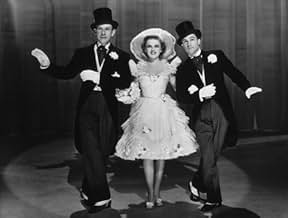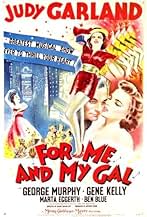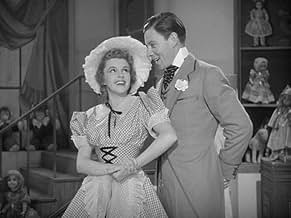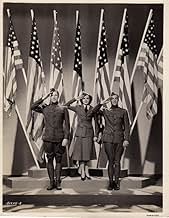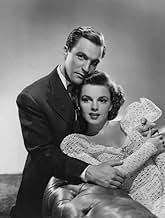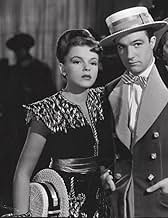AVALIAÇÃO DA IMDb
7,0/10
4,1 mil
SUA AVALIAÇÃO
Adicionar um enredo no seu idiomaTwo vaudeville performers fall in love, but find their relationship tested by the arrival of WWI.Two vaudeville performers fall in love, but find their relationship tested by the arrival of WWI.Two vaudeville performers fall in love, but find their relationship tested by the arrival of WWI.
- Direção
- Roteiristas
- Artistas
- Indicado a 1 Oscar
- 4 vitórias e 1 indicação no total
Mártha Eggerth
- Eve Minard
- (as Marta Eggerth)
Stephen McNally
- Mr. Waring
- (as Horace McNally)
Ernie Alexander
- Theater Workman with Big Die
- (não creditado)
Hooper Atchley
- Assistant Stage Manager
- (não creditado)
Walter Baldwin
- Bill
- (não creditado)
Gurney Bell
- Member - Sportsmen Quartet
- (não creditado)
Herman Boden
- Soldier
- (não creditado)
John Breen
- Soldier
- (não creditado)
Ken Darby
- Member - The King's Men
- (não creditado)
George Davis
- France Taxi Driver
- (não creditado)
Bill Days
- Member - Sportsmen Quartet
- (não creditado)
John Dilson
- Lou
- (não creditado)
Jon Dodson
- Member - The King's Men
- (não creditado)
Lester Dorr
- Stage Manager
- (não creditado)
Avaliações em destaque
'For Me and My Gal' had so much going for it on paper, with the involvement of immensely talented people like Judy Garland, Gene Kelly and Busby Berkeley. It has its flaws, but when it's good it's fabulous and showcases the two stars brilliantly.
The story and script are admittedly slight and heavy in the clichés, complete with an ending that feels tacked on (and apparently it was, hardly surprising). The supporting cast's performances also don't compare to those of Kelly and Garland. Well George Murphy is good, he is very likable and charming, the problem is that he is underused and deserved more considering his talent. Ben Blue is unfunny and annoying however, and Marta Eggerth seemed out of place, am a fan of the operatic style of singing but there are far more beautiful voices than Eggerth's rather shrill and metallic sound and the singing doesn't really fit the style of the songs.
However, it is very difficult to be too hard on 'For Me and My Gal' because it fills me with so much joy and really does tug at the heart. The best thing about the film is Garland, who is absolutely sensational, with remarkably graceful dancing and as ever her voice is one you can listen to for hours and not get enough of. Her role here is also one of her most relatable and radiantly likable ones. Kelly may have had more endearing roles in his career, but he really shines in charm and technical skill in his debut where his material plays marvellously to his strengths. The two of them are simply magical together, and one is entranced every time they're on screen together or individually.
It is also a visually beautiful film. Technicolor it ain't, but it is not a film that cries out for it. The lavishness and elegant sumptuousness is still there and it is beautifully filmed. The songs are truly lovely, with the title song and "When You Wore a Tulip" standing out, and advantaged even further by top-notch direction and choreography by Berkeley (throughout, but especially in those two numbers), it may lack the kaleidoscopic style of his earlier films but never looks overblown or static, basically what cinema is all about.
While flawed, the story is still very charming, is lots of fun and there are also some genuinely touching parts that tug at the heart-strings. The pacing never feels dull, even with the slightness, which faces the danger of over-stretching and padding, and over-familiarity.
All in all, not a favourite but for fans of Kelly, Berkeley and especially Garland it is a must regardless of its issues. 8/10 Bethany Cox
The story and script are admittedly slight and heavy in the clichés, complete with an ending that feels tacked on (and apparently it was, hardly surprising). The supporting cast's performances also don't compare to those of Kelly and Garland. Well George Murphy is good, he is very likable and charming, the problem is that he is underused and deserved more considering his talent. Ben Blue is unfunny and annoying however, and Marta Eggerth seemed out of place, am a fan of the operatic style of singing but there are far more beautiful voices than Eggerth's rather shrill and metallic sound and the singing doesn't really fit the style of the songs.
However, it is very difficult to be too hard on 'For Me and My Gal' because it fills me with so much joy and really does tug at the heart. The best thing about the film is Garland, who is absolutely sensational, with remarkably graceful dancing and as ever her voice is one you can listen to for hours and not get enough of. Her role here is also one of her most relatable and radiantly likable ones. Kelly may have had more endearing roles in his career, but he really shines in charm and technical skill in his debut where his material plays marvellously to his strengths. The two of them are simply magical together, and one is entranced every time they're on screen together or individually.
It is also a visually beautiful film. Technicolor it ain't, but it is not a film that cries out for it. The lavishness and elegant sumptuousness is still there and it is beautifully filmed. The songs are truly lovely, with the title song and "When You Wore a Tulip" standing out, and advantaged even further by top-notch direction and choreography by Berkeley (throughout, but especially in those two numbers), it may lack the kaleidoscopic style of his earlier films but never looks overblown or static, basically what cinema is all about.
While flawed, the story is still very charming, is lots of fun and there are also some genuinely touching parts that tug at the heart-strings. The pacing never feels dull, even with the slightness, which faces the danger of over-stretching and padding, and over-familiarity.
All in all, not a favourite but for fans of Kelly, Berkeley and especially Garland it is a must regardless of its issues. 8/10 Bethany Cox
I thought Judy Garland gave an Oscar worthy performance in this movie. As for Gene Kelly, it was hard to believe that this was his movie debut, his acting made it seem as if he'd been around Hollywood for years. And oh, that musical score, remeniscent of some film scores by Irving Berlin. Not just your ordinary musical, this one has a fine story that fits in with the time of World War One. The title song as done by Garland & Kelly is a classical show-stopper. For sentimentalists, like my wife and I, there are a few scenes that tug at the heart strings, and provide for some misty eyes.
Though a thinly veiled piece of propaganda for WWII sentiment, it did the trick. I couldn't believe I cried not once but three times at this Kelly/Garland musical. An amusement park of a flick. With rollercoaster rides of joy, mood swings of sadness and insecurities, all rolled into a sappy feel good post-depression fluff. Who needs hormones when you can watch this. Great star vehicle for Kelly,it catapulted him into the rarified air of those who have talent, good looks, and that certain "something". Though at times he seems a bit in awe of his surroundings, it comes off as cockiness and works. Garland's sense of innocent security grounded this film and proved she was already in the stratosphere. The supporting cast held up their ends admirably. Enough to make this film enjoyable even in these jaded times.
If this movie was simply Gene Kelly and Judy Garland exchanging quips (the "Hello Springtime!" bit is especially good) and singing and dancing in a coffee shop, then it would still be entertaining. But that's really not all it is. This movie is more like a drama/romance than a musical, in the way that there are some songs, very good ones, but there is more story than numbers. Yes, the idea is an old one, but there are a few twists that distinguish it from any other wartime romance. (Don't go expecting The Maltese Falcon though.) The little plot weaknesses are forgotten as the actors (particularly Garland) hold it all together. I cried twice, and I almost never cry at movies. I fully recommend For Me and My Gal, unless you're dead-set on a tear-free day.
This was Gene Kelly's first foray into film, thanks to Judy Garland. Judy herself is only three years beyond "The Wizard of Oz" and at the top of her talents. Their pairing alone makes this a film worth seeing. Now, when we hear their voices harmonizing---especially in the title song---it feels iconic.
This is really two films joined together. The first part is the story of vaudeville, and an opening dedication page says that. As their characters, Jo and Harry, meet, team up and struggle to make the big time, the viewer is regaled by song and dance, specialty acts and vaudevillian humor. George Murphy plays the part of Jimmy Metcalf, who winds in and out of their lives.
The action takes place in 1916, just before the U. S. enters WWI. When the RMS Lusitania is sunk, the tenor and style of the film changes. Audiences in 1942 could identify with the patriotic fervor depicted, and it stimulated their nationalistic impulses to buy war bonds, participate in various drives, and forgo many luxuries. The second section of the film, much of which is a montage, is designed to stir up a unified American response to the Axis powers. So, there is no discussion of isolationism or Washington's warnings against foreign entanglements, though they might have been authentic.
In that second section, Jo and Harry's story is secondary to the bigger national story, but it is still there. Unfortunately, the dramatic transition between the two parts is thematically disruptive. It's a criticism that filmgoers of the forties would not have lodged. The review by the New York Times, in its roundabout way, does find fault with the script and its tale of two stories.
Martha Eggerth, the soaring soprano, plays a small role that is notable because she seldom appeared in films west of the Atlantic.
This is a film worth seeing, especially as an example of wartime cinema.
This is really two films joined together. The first part is the story of vaudeville, and an opening dedication page says that. As their characters, Jo and Harry, meet, team up and struggle to make the big time, the viewer is regaled by song and dance, specialty acts and vaudevillian humor. George Murphy plays the part of Jimmy Metcalf, who winds in and out of their lives.
The action takes place in 1916, just before the U. S. enters WWI. When the RMS Lusitania is sunk, the tenor and style of the film changes. Audiences in 1942 could identify with the patriotic fervor depicted, and it stimulated their nationalistic impulses to buy war bonds, participate in various drives, and forgo many luxuries. The second section of the film, much of which is a montage, is designed to stir up a unified American response to the Axis powers. So, there is no discussion of isolationism or Washington's warnings against foreign entanglements, though they might have been authentic.
In that second section, Jo and Harry's story is secondary to the bigger national story, but it is still there. Unfortunately, the dramatic transition between the two parts is thematically disruptive. It's a criticism that filmgoers of the forties would not have lodged. The review by the New York Times, in its roundabout way, does find fault with the script and its tale of two stories.
Martha Eggerth, the soaring soprano, plays a small role that is notable because she seldom appeared in films west of the Atlantic.
This is a film worth seeing, especially as an example of wartime cinema.
Você sabia?
- CuriosidadesGene Kelly's film debut. It is known that Judy Garland got him the job after seeing him in the Broadway musical "Pal Joey". Kelly made films in a variety of genres over the next few years but became best known for his energetic dancing style in MGM hits such as Marujos do Amor (1945), Um Dia em Nova York (1949), and Sinfonia de Paris (1951). Kelly, who was a choreographer and director as well as a dancer and singer, received a special Academy Award in 1951 in recognition of his outstanding achievement as an actor, dancer, singer and director. He also received a Life Achievement Award from the American Film Institute in 1985. The song "For Me and My Gal" became one of Kelly's signature songs.
- Erros de gravaçãoJo's YWCA uniform (like much of her clothing in the latter half of the film) is characteristic of World War II, when the film was released, and not World War I, in which it is set. Her uniform's shoulders are too broad and the skirt too short, and she is wearing sheer stockings and pumps instead of opaque stockings and high boots or oxfords.
- Citações
Harry Palmer: Why didn't you tell me I was in love with you?
- Cenas durante ou pós-créditosA picture of an infantry soldier in New York harbor and the text "America needs your money. Buy war bonds and stamps at this theatre."
- Versões alternativasThere is a 1993 colorized version of the film that aired on TNT
- ConexõesEdited into American Masters: Gene Kelly: Anatomy of a Dancer (2002)
- Trilhas sonorasFor Me and My Gal
(1917) (uncredited)
Music by George W. Meyer
Lyrics by Edgar Leslie and E. Ray Goetz
Played during the opening credits and often as background music
Played on piano (with background orchestra) by Judy Garland (uncredited) and sung and danced by her and Gene Kelly (uncredited)in a coffee shop
Reprised by Judy Garland (uncredited), Gene Kelly (uncredited) and chorus at the end
Principais escolhas
Faça login para avaliar e ver a lista de recomendações personalizadas
- How long is For Me and My Gal?Fornecido pela Alexa
Detalhes
- Data de lançamento
- País de origem
- Idiomas
- Também conhecido como
- For Me and My Gal
- Locações de filme
- Empresa de produção
- Consulte mais créditos da empresa na IMDbPro
Bilheteria
- Orçamento
- US$ 802.000 (estimativa)
- Tempo de duração
- 1 h 44 min(104 min)
- Cor
- Proporção
- 1.37 : 1
Contribua para esta página
Sugerir uma alteração ou adicionar conteúdo ausente



